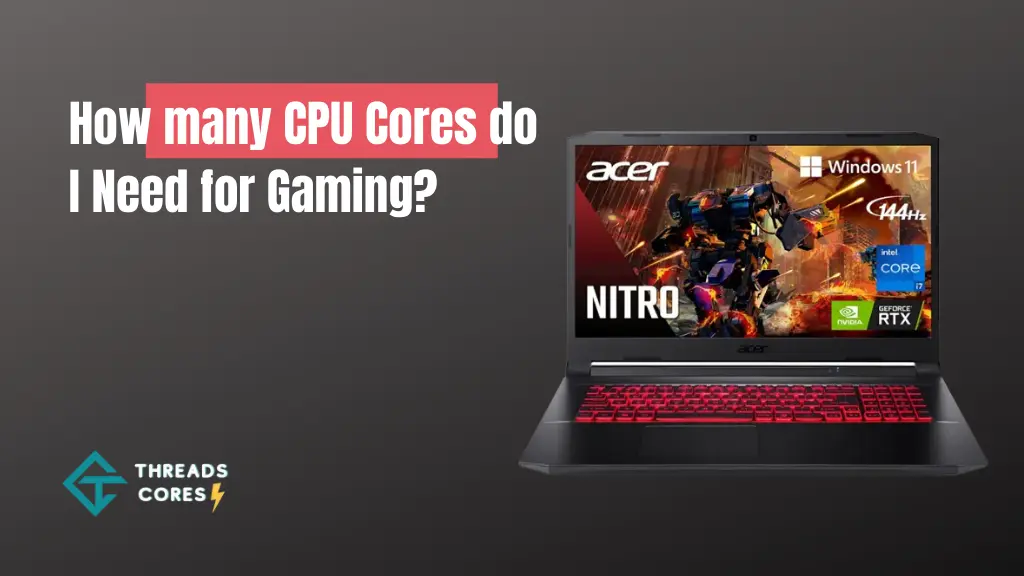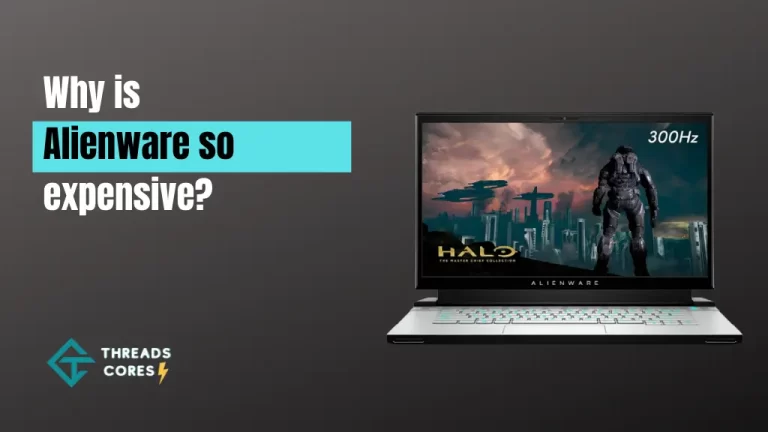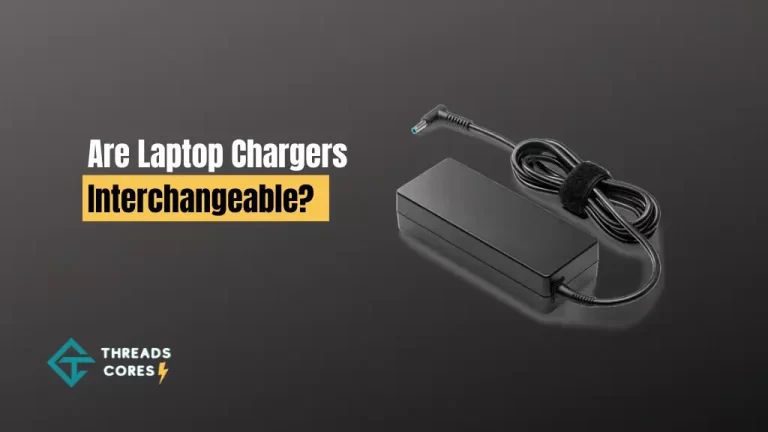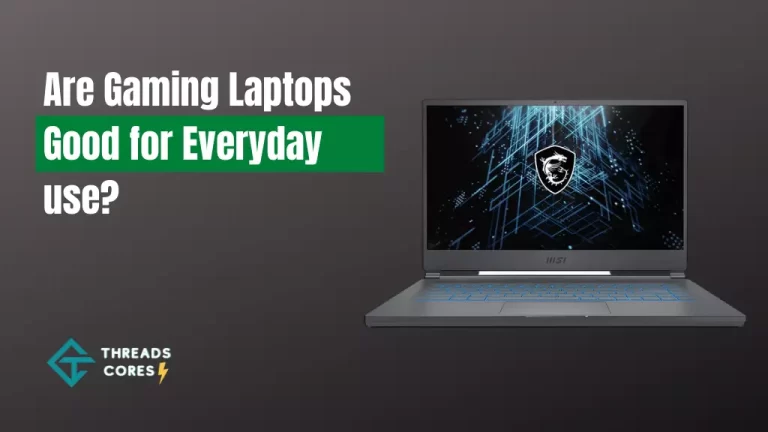
There’s no question that laptops have come a long way in terms of gaming performance. However, with all the different processor options available, it cannot be very clear to determine which one is right for you. So let’s get started! In this blog post, we’ll help you decide how many CPU cores you need for gaming. By the end of it, you’ll know exactly what to look for when shopping for your next gaming laptop.
Related: Are Toshiba Laptops Good For Gaming?
How many CPU Cores do I Need for Gaming?
What are CPU Cores?
Simply put, cores are mini-processors that handle instructions and send them to the main processor (CPU) for processing. So every laptop will have a CPU that consists of one or more cores along with other components such as the motherboard and graphics card.
Here’s how it works:
If you’re shopping for a laptop based on the types of games you want to play, you need to know how many cores a processor has to compare performance. In general, one core is not enough for playing current generation video games. For an average laptop with integrated graphics, two cores can handle some less demanding mobile games, but that’s it.
In other words, the more cores you have, the better your games will perform.
So how many CPU cores do you need for gaming?
Here’s a quick overview of what to look for depending on your budget:
For gaming laptops under $800 / £700… You’ll want at least four cores, but six cores are far better. For gaming laptops under $500… You can’t expect much from a laptop with less than four cores. Six cores are barely ok as well. In short, if you’re looking for serious gaming performance, then your best bet is to look for a laptop with an Intel i5 or higher processor.
In other words, the more cores you have, the better your games will perform.
Related: Top 6 Best Gaming Laptops Under 3000
Also, Read: 6 Best Gaming Laptop For Call Of Duty Warzone
Physical Cores vs. Logical Cores
Before we continue, it’s important to distinguish between physical cores and logical cores.
Logical Cores are independent of each other by design to execute different instructions at the same time. This is why some benchmarks show results above 4 or more cores even though the processor only has 2 ‘real’ physical cores.
Physical cores are actual hardware components inside your CPU. There are two types of physical cores:
Hyper threading Cores function similarly to logical cores, but you get half the performance per core. For example, if a CPU has 4 physical cores with 2 hyper threaded cores, there are 8 logical cores available for games. Cluster-shared Cache consists of a shared cache divided into whatever the processor cores need.
Beware: not all processors have both types of physical cores! Those with hyper threading usually do not include cluster-shared cache because they’re meant to function as logical cores instead of physical ones.
In short, you always want to make sure you’re buying a laptop with physical cores when looking for performance.
AMD vs. Intel Processor Cores Comparison
When it comes to CPUs, there are essentially three manufacturers that you need to know about:
Intel has the most number of unique processor core models. For example, their i5-7300HQ has 4 physical cores with no hyperthreading and no shared cache. AMD is known for having better price per-core performance than Intel. However, they only have 2 unique processor core models to choose from in the mobile market: FX-9830P and Ryzen 7-3700HQ.
Nvidia vs. AMD Graphics Processor Comparison
Only two manufacturers need to be considered for graphics cards when shopping for a gaming laptop: Nvidia and AMD. Unfortunately, there’s no way you can tell which one is better just by looking at the model name. When it comes to graphics performance, you need to take a look at benchmark results to decide whether an AMD or Nvidia card performs better.
When it comes to laptops, there are also two types of graphics processors:
Discrete – non-integrated graphics processors which can be found in high-end laptops
Integrated – non-discrete graphics processors used in all other laptop types, even budget ones.
The main difference between these two is simple: integrated cards can never be upgraded, while discrete cards can (most of the time). You want to look for a laptop with an Nvidia discrete graphics card for gaming purposes.
Bottlenecking
Now that you know how many physical cores your CPU needs, the next factor to consider is whether it can fully utilize them
All CPUs have a maximum number of instructions they can process per clock cycle. If this limit is reached, games will run slowly because the processor has to wait until it gets new instructions from the game.
In other words, if its number of cores bottlenecks your CPU’s performance, then it has reached maximum capacity and won’t be able to perform as well as a better CPU without reaching this limit.
Bottom line: the more physical cores you have, the higher the chance that a game will not bottleneck them. However, other factors like cache size, CPU speed, and the number of threads can affect performance.
So what’s the reason behind this? Simple: modern PC games usually consist of minimal instructions that can be processed by any CPU core available. These instructions will only bottleneck the CPU if they cannot be split into smaller pieces to run simultaneously on different cores.
That said, there are occasions where a CPU cores bottleneck may happen
CPU-dependent games – for example, most strategy and adventure/role-playing games will generally not reach the number of physical cores you have because they tend to rely on single-threaded performance.
So the question is: how do you know if your game is CPU-limited or not?
Process Lasso’s Performance Profile
As mentioned above, only strategy games usually need extremely high single-threaded performance. For all other types of games, you’ll want to make sure that the CPU cores you’re buying are not bottlenecked.
With Process Lasso, you can do this by prioritizing background processes. If the number of cores limits your game, then performance will improve significantly when setting high priority to your game’s process(es). If it’s bottlenecked by the CPU speed, performance will improve when setting high importance to your background processes.
How Many Cores are Enough for 1080p Gaming?
For most games, you can get away with a dual-core CPU. But not all of them. If your goal is to play games at 1080p resolution, then even a budget laptop should handle it without any issues.
More cores will give you better performance when playing graphically demanding games at 1080p, but in order for this to occur, you’ll need a discrete graphics card too. And not all discrete GPUs are created equal.
1080p gaming is still fairly popular, and most games run on the mid-range hardware that gamers can afford today (CPU and GPU). If you’re looking for a system that will play 1080p games at decent settings, we recommend getting a CPU with at least 2 cores, decent single-threaded CPU speed, and a discrete graphics card.
The good news is that you’ll find a laptop meeting these requirements without breaking the bank. For example, a Core i3 7100HQ + GeForce 1050 Ti laptop will handle any modern game at 1080p on high settings. There are other combinations available (like i5 + 1050 Ti and i5 + 1060) – these will give you slightly better performance.
On the other hand, if you’re looking for maximum gaming performance at 1080p, we recommend getting a quad-core CPU or higher, with a high single-threaded CPU speed (at least 3.0GHz).
Related: Best Gaming Laptops For Red Dead Redemption 2
Frequently Asked Questions
1. How many CPU cores do I need for gaming and streaming?
The number of CPU cores required for gaming and streaming depends on various factors, such as the games you play, the streaming resolution, and the streaming software you use. Typically, for basic streaming at 720p or 1080p resolution, a quad-core CPU with hyper-threading should suffice. However, for higher streaming resolutions, such as 1440p or 4K, and more demanding games, you may need more cores.
It is also worth noting that other factors, such as the quality of your internet connection, graphics card, and RAM, can affect your streaming performance. Therefore, it is recommended to consult with a professional or do thorough research before deciding on the number of CPU cores required for gaming and streaming.
2. Are more CPU cores better for gaming?
While having more CPU cores can be beneficial for gaming, it is not always necessary. Most games today do not require more than four cores to run optimally. However, having additional cores can help improve performance in certain CPU-intensive games, such as strategy games, simulation games, and massively multiplayer online games (MMOs).
Furthermore, having more cores can also help with multitasking, allowing you to run other programs in the background while gaming. Therefore, while more cores can be beneficial, it is not always necessary for gaming.
3. Is 12 cores overkill for gaming?
For most gamers, 12 cores is considered overkill for gaming. Most games today do not require more than four cores to run optimally. Even in CPU-intensive games, having more than eight cores does not offer a significant performance increase. However, if you are a content creator, video editor, or work with other CPU-intensive tasks, having more cores can be beneficial.
4. Do you need 8 cores for gaming?
No, you do not need eight cores for gaming. Most games today do not require more than four cores to run optimally. However, having more cores can help improve performance in certain CPU-intensive games and allow for better multitasking. Therefore, while eight cores may not be necessary for gaming, it can be beneficial in certain situations.
5. Are 6 cores enough for gaming?
Yes, six cores are enough for gaming. Most games today do not require more than four cores to run optimally, so having six cores can offer ample performance. However, having more cores can help improve performance in certain CPU-intensive games and allow for better multitasking. Therefore, while six cores may be enough for gaming, having more cores can be beneficial in certain situations.
6. Do CPU cores increase FPS?
Having more CPU cores does not always increase FPS (frames per second) in games. While CPU performance can affect gaming performance, other factors such as GPU (graphics card) performance, RAM speed, and storage type can also affect FPS. However, in certain CPU-intensive games, having more cores can offer a slight performance increase.
It is also worth noting that having more cores can improve multitasking performance, allowing you to run other programs in the background while gaming. Therefore, while more cores may not always increase FPS, they can be beneficial in certain situations.
7. Is 6 cores 12 threads enough for gaming?
Yes, six cores and 12 threads are enough for gaming. Most games today do not require more than four cores to run optimally, so having six cores and 12 threads offers ample performance. However, having more cores and threads can help improve performance in certain CPU-intensive games and allow for better multitasking. Therefore, while six cores and 12 threads may be enough for gaming, having more cores and threads can be beneficial in certain situations.
8. Do I need 16 cores for gaming?
No, you do not need 16 cores for gaming. Most games today do not require more than four cores
9. Is a 10-core CPU enough for gaming?
Yes, a 10-core CPU is enough for gaming. Most modern games require at least a quad-core CPU to run smoothly, but a 10-core CPU can provide even more processing power for tasks like video editing or streaming. However, the most important factor for gaming performance is not the number of cores, but the CPU’s clock speed and single-core performance.
10. Is a 6-core CPU better than a 12-core CPU?
It depends on what you plan to use the CPU for. In most cases, a 6-core CPU will perform better in games and everyday tasks than a 12-core CPU with lower clock speeds. However, if you plan to use your computer for heavy multitasking, video editing, or other CPU-intensive tasks, a 12-core CPU may be more efficient.
11. How many cores do I need for 4K gaming?
For 4K gaming, you will need a CPU with at least 4-6 cores. However, as with any other gaming performance, the clock speed and single-core performance are more important than the number of cores. In addition to the CPU, you will also need a powerful graphics card and enough RAM to handle the high-resolution textures and other demands of 4K gaming.
12. Does 32GB of RAM increase FPS?
Not directly. RAM is important for overall system performance, but increasing the amount of RAM will not directly increase your FPS (frames per second) in games. However, if your system is running out of RAM while gaming, it can cause stuttering and other performance issues, which can negatively affect your FPS.
13. Does more cores mean faster?
Not necessarily. While more cores can provide more processing power for multitasking and CPU-intensive tasks, the clock speed and single-core performance are more important for most everyday tasks and gaming performance. In fact, some CPUs with fewer cores can outperform CPUs with more cores in certain scenarios.
14. What CPU gives the most FPS?
There is no single CPU that gives the most FPS, as gaming performance depends on multiple factors, including the graphics card, RAM, and CPU clock speed and single-core performance. However, Intel’s high-end gaming CPUs, such as the Core i9-11900K or the Core i7-11700K, are known for their strong gaming performance.
15. How many cores does GTA 5 use?
GTA 5 can use up to 8 CPU cores. However, the game’s performance is more dependent on single-core clock speed and GPU performance than on the number of CPU cores.
16. How many cores does the PS5 have?
The PS5 has an 8-core AMD Zen 2 CPU with a clock speed of 3.5 GHz. This CPU has been specifically designed for gaming and provides enough processing power for high-performance gaming and multitasking.
17. How many CPU cores does Fortnite use?
Fortnite can use up to 4 CPU cores, but the game’s performance is more dependent on GPU performance and RAM than on the number of CPU cores.
Conclusion
It’s important to know your personal computing needs before purchasing a new gaming computer. If you are only playing the occasional game, an Intel Pentium G4560 3.5 GHz Quad-Core will be sufficient for running most games at medium settings with decent frame rates.
For those who play more demanding games or want smoother gameplay on higher graphics settings, consider upgrading to an AMD Ryzen 5 1400 3.2 GHz Hexa-Core processor and NVIDIA GeForce GTX 1050 2GB Dedicated Graphics Card, which has been shown in independent lab tests to provide smooth performance even when rendering high-quality graphics that demand speed from both CPU and GPU resources simultaneously.
Let me know if you have any questions related to how many core do you need for gaming.

I believe good gaming is not only about how it is played but how smooth it is.







